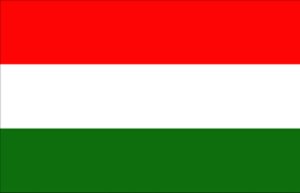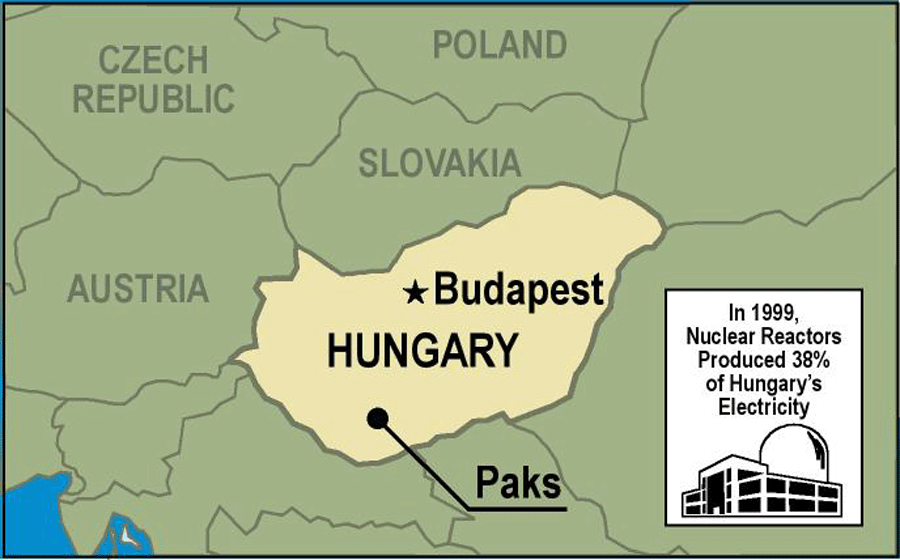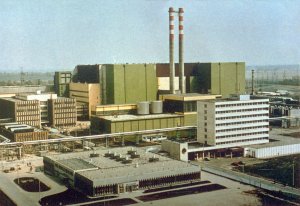 |
 HUNGARY
HUNGARY
Paks Nuclear Power Plant
Country ProfileSize: 35,919 square miles (slightly smaller than Indiana)
Electricity Production1: 35.1 billion kWh (1998)
|

Hungary's Nuclear Power Program
Hungary operates one nuclear power plant at Paks on the Danube River. In 1999, the four VVER-440/213 reactors at Paks produced about 38 percent of the country's electricity. The plant's management has recognized the importance of nuclear information exchange and has established several programs to increase the flow of operating experience information to the plant's operators. In addition, the Paks plant has raised its performance level with the help of a new full-scope simulator. The simulator is used to train staff and to test emergency procedures. Following such a test in 1990, plant management made significant improvements to these procedures.
Hungary's Key Nuclear Organizations
- National Committee for Technological Development - ministerial-level organization with responsibilities for nuclear power development and policy.
- Hungary Atomic Energy Commission - Hungarian nuclear regulatory authority.
- Hungarian Power Company - Hungarian national utility; owner and operator of Paks Nuclear Power Plant.
- Institute for Electric Power Research - organization responsible for nuclear power research and development.
Paks Nuclear Power Plant

Plant Manager: Emo Petz
Utility: Paks Nuclear Power Plant, Ltd.
Telephone No.: 36-75-318-908
Fax: 36-1-155-1332
| Unit | Reactor Model |
Net Output |
Initial Start |
Status |
|---|---|---|---|---|
| 1 | VVER- 440/213 |
430 MWe | 12/1982 | Operating |
| 2 | VVER- 440/213 |
433 MWe | 8/1984 | Operating |
| 3 | VVER- 440/213 |
433 MWe | 9/1986 | Operating |
| 4 | VVER- 440/213 |
433 MWe | 8/1987 | Operating |
Scope and Status of Activities
The primary focus of DOE's efforts at Paks nuclear power plant has been the safety of day-to-day operations. Projects include development of improved operating procedures and practices (1992-1995) and transfer of capabilities for performing plant safety analyses (1996-1998).
Accomplishments
Management and Operational Safety- Operator exchanges that trained plant personnel to develop improved operating safety procedures and practices were completed.
- A complete set of management and operational control procedures that promote safety through improved operating practices was developed and implemented at the plant.
- Tools and methods for evaluating operators during training on control room simulators were developed.
- Representatives from the Hungarian regulatory agency and the Paks plant
attended a regulatory workshop for training on symptom-based emergency operating
procedures.
Plant Safety Evaluations
- Technology transfer and training were provided to plant staff in the area of human performance during emergencies.
- Analysis capability and training were provided to Hungarian technical specialists to enable them to evaluate the potential for combustion/detonation of hydrogen, which could threaten the plant's containment integrity for accident scenarios. Analyses were carried out on the transient transport and mixing of hydrogen inside the containment atmosphere during an accident scenario.
- U.S. experts analyzed the ability of the reactor confinement structures to withstand the pressure likely to be created in an accident and determined that the structures are adequate.
- The COBRA-SFS computer code was transferred to Hungary for use in evaluating
spent fuel storage systems.
| | Contents | Foreword | Program Overview | Armenia | Bulgaria | Czech Republic | Hungary | Kazakhstan | Lithuania | Russia | Slovakia | Ukraine | Appendix A | Appendix B | Appendix C | Contacts | |